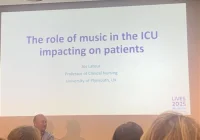A multi-centre randomised controlled trial of critically ill adults aged 50 years and older admitted to ICUs found that twice-daily slow-tempo music (60–80 beats per minute) did not reduce the duration or severity of delirium or coma, nor did it lessen pain or anxiety compared with a silence-track control.
While the intervention did not significantly impact delirium outcomes, exploratory analyses revealed a trend toward fewer delirium/coma days among patients who received at least seven sessions of slow-tempo music, and among those exposed to benzodiazepines. These findings highlight the need for further investigation into music as a potential adjunctive therapy for older critically ill adults.
Delirium, a common and serious condition affecting up to 75% of older ICU patients, is associated with adverse outcomes, including prolonged hospitalisation and post-ICU cognitive decline.
The Decreasing Delirium through Music in Critically Ill Older Adults (DDM) trial was conducted across Indiana University School of Medicine-affiliated hospitals (Indiana University Health and Sidney and Lois Eskenazi Hospital, Indianapolis) and Mayo Clinic, Rochester, Minnesota, with collaborators from IU School of Medicine, Mayo Clinic, Regenstrief Institute, Anglia Ruskin University, and Area 10 Labs.
The two-arm trial used concealed outcome assessments and compared a curated playlist of slow-tempo music with a silence-track control. Sessions were delivered twice daily for up to seven days via computer tablets and noise-cancelling headphones. The DDM trial also demonstrated the feasibility of app-based, centralised delivery and tracking of music “dose” in the ICU.
Published in JAMA Internal Medicine under the title “Slow-Tempo Music and Delirium/Coma-Free Days Among Older Adults Undergoing Mechanical Ventilation: A Randomized Controlled Trial,” the study refines understanding of nonpharmacologic interventions for delirium prevention.
Despite the intuitive appeal of calming music in the ICU, the trial showed that prescribed slow-tempo playlists did not reduce delirium, pain, or anxiety, nor affect length of ventilation or stay. These findings refine current practice and point toward more personalised, therapist-guided approaches.
The findings suggest possible benefits among patients exposed to benzodiazepines or those receiving longer music exposure, raising new questions about the interaction between sedation and music effects.”
Key contributions of the DDM Trial:
- Refines practice: Counters the assumption that early, slow-tempo playlists improve delirium/coma-free days.
- Strengthens evidence: Adds rigorous, multi-centre RCT data with concealed outcome assessments to a field where many pharmacologic delirium trials have been negative.
- Guides future research: Suggests examining longer duration, targeted subgroups (e.g., by sedation profile), or post-ICU timing of music intervention.
- Demonstrates feasibility: First trial to use the Soundese iPad app to deliver and track music dose, establishing a scalable model for ICU behavioural studies.
- Confirms safety and fidelity: No serious adverse events occurred; adherence and timing were consistent, supporting safe, practical implementation.
Source: JAMA
Image Credit: Pixabay








